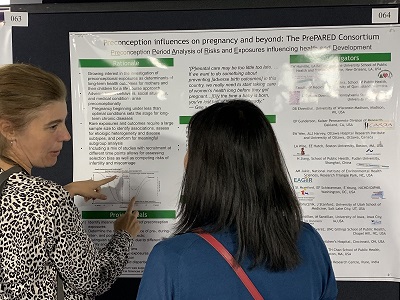
Preconception Period Analysis of Risks and Exposures Influencing Health and Development
“[P]renatal care may be too little too late. … If we want to do something about preventing [adverse birth outcomes] in this country, we really need to start taking care of women’s health long before they get pregnant…[B]y the time a baby is born, you’ve lost half of the battle already.”

Interest in the investigation of preconceptional exposures as determinants of long-term health outcomes for both mothers and their children. Targeting the preconception time period is a potentially effective strategy to reduce health disparities.
The goals of the PrePARED consortium is to use the large number of studies, cross-sectional and longitudinal data, and mix of studies to:
- Identify meaningful (at a clinical or population level) effect sizes of preconception exposures
- Determine the relative importance of pre-, during-, inter-, and post-pregnancy effects
- Distinguish selection effects due to differential fertility and pregnancy loss
- Identify possible mechanisms
- Examine rare-prevalence exposures and outcomes
- Examine effect modification in associations between preconception exposures and health outcomes across subgroups of interest (e.g., age, race/ethnicity, socioeconomic status).
The PrePARED Consortium: Policies and Procedures


- Australian Longitudinal Study on Women’s Health
- The Bogalusa Heart Study
- CARDIA
- Central Pennsylvania Women’s Health Study
- EAGeR
- HOPE
- PRESTO
- Pune Maternal Nutrition Study
- Snart Gravid/Foraeldre
- Time to Conceive
- Upstate Kids
- Women's Health Tissue Repository
- Global Pregnancy Collaboration (CoLab)
- Longitudinal Investigation of Fertility and the Environment (LIFE) Study
- National Growth and Health Study
- Preconceptional Offspring Trajectory Study (PLOTS)
- Longitudinal Indian Family Health
- Time to Pregnancy in Normal Fertility Study
For more information, please contact Emily Harville at prepared@wave.tulane.edu.
